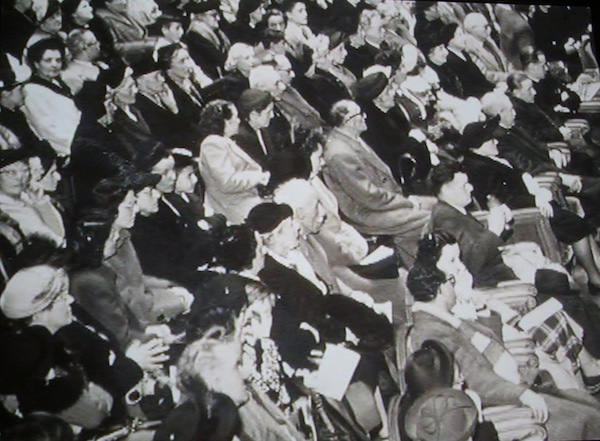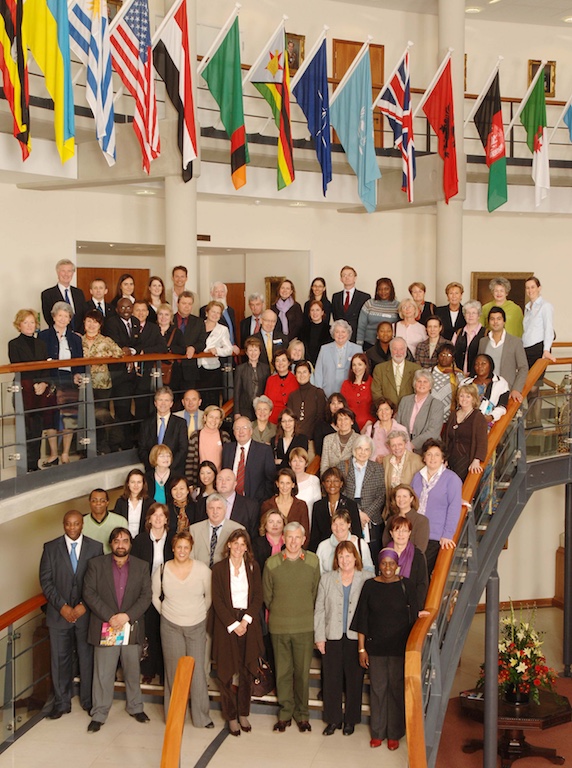More than 75 years standing with mothers
A Legacy of Action

International Congress “Mothers Work for Human Progress “, UNESCO 1947
Paris, 1947. At UNESCO, 29 countries gathered around a groundbreaking idea championed by hundreds of mothers: Motherhood is not just private — it’s a civic, social, and economic force. A silent driver of peace.
From this historic moment, the World Movement of Mothers was born — now known as Make Mothers Matter (MMM). They drafted the Mother’s Charter, declaring a simple but powerful truth: Mothers are the first builders of human society.
Post-war France was in ruins. Cities shattered, thousands of men lost. Women — especially mothers — stepped in: they worked, they fed, they healed, they led. Yet, their contributions went unrecognised. Their resilience, unnoticed. If societies held together, it was thanks to women — but no one talked about them.
MMM has spent over 75 years bringing mothers’ voices to the forefront — on every continent, in every arena — advocating for motherhood to be acknowledged as a central issue in social progress, peace-building, and policy-making.
Why Mothers Matter More Than Ever
In today’s world of overlapping crises — economic, health, environmental — mothers continue to carry the weight: they absorb shocks, provide care, rebuild communities.
When the UN adopted the Sustainable Development Goals, MMM reminded the world: many of these goals depend on mothers — from health and education to poverty reduction. The unpaid domestic and care work represents between 10% and 40% of GDP depending on the country, and is mostly carried out by women — especially mothers.
Our Belief: Support Mothers, Strengthen the World
Since 1947, Make Mothers Matter has stood by one core conviction:
When a mother is heard, informed, and supported — families grow stronger, children thrive, economies prosper, and peace becomes possible.
The Time Is Now.
The fight for mothers is urgent.
Because if we want to change the world, we must support those who carry it.
Important Milestones

“A secure society for the 21st centure– Why mothers matter”, Seminar at the Defence Academy of the United Kingdom in Oxford, April 2008.
1947: Creation of the Mouvement Mondial des Mères/World Movement of Mothers (MMM) at UNESCO in Paris. The “Mother’s Charter” is adopted.
1949: MMM is among the first NGOs to be granted Consultative Status with the United Nations – Thus allowing mothers’ voice to be heard at the international level.
1994: MMM receives the « International Year of the Family » award – as 1994 is declared the International Year of the Family by the UN.
1999: MMM’s 50th anniversary is celebrated at UNESCO with an international conference on “The family and the social dynamics of mother’s work”.
2003: Organization of a conference in Lebanon on the “Role of mothers in building peace.”
2004: Organization of two seminars with the NATO in Moldavia and in Slovakia.
2004: MMM is granted General Consultative Status with the UN Economic and Social Council (ECOSOC).
2007: MMM’s 60th anniversary is celebrated with an international congress at the UNESCO in Paris “1000 mothers for peace”.
2008: Oxford Study conference: “A secure society for the 21st century– Why mothers matter”
2014: The Mouvement Mondial des Mères/World Movement of Mothers officially becomes Make Mothers Matter, a name which clearly incorporates its mission.
2016: Organisation of an international conference “Mothers and Health” in Brussels.
2018: Organisation of an international conference “#Mothers4Peace” in Casablanca, Morroco
2019: London School of Economics (LSE) – Launch of the #RaiseAPen Campaign for Afghan women and girls’ right to education
2020: Launch of the MMM Voices video series to give a voice to our grassroots members around the world in the context of the COVID-19 crisis
The Mother’s Charter
The 1947 Mother’s Charter, was a pioneering document for its time. It has guided our work for many years.
Extracts:
A mother’s influence goes far beyond the home – It impacts through her role in the family and community and her contribution to the economic and social development of her country.
The organisation of family and social life has to take into account the fundamental equality between a man and a woman while recognising their complementary nature. A woman must be free to choose her state of life and allowed fulfillment in all her activities in the home and outside.
Public organisations should acknowledge the importance of the education given by the family through financial support and appropriate legislation.
The role of a mother within the family is as irreplaceable as that of the family in society.





